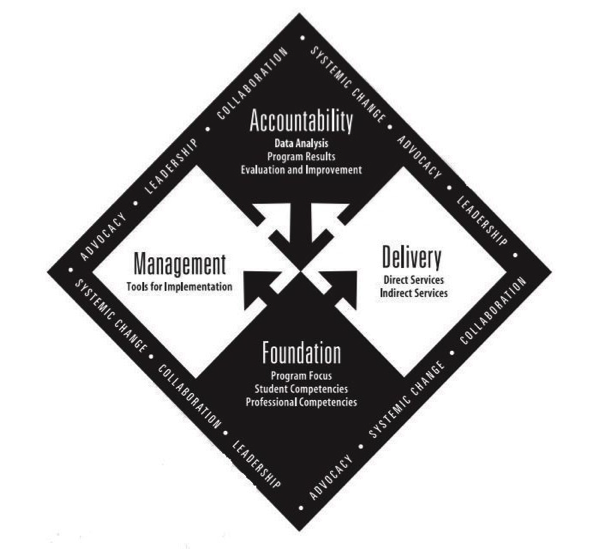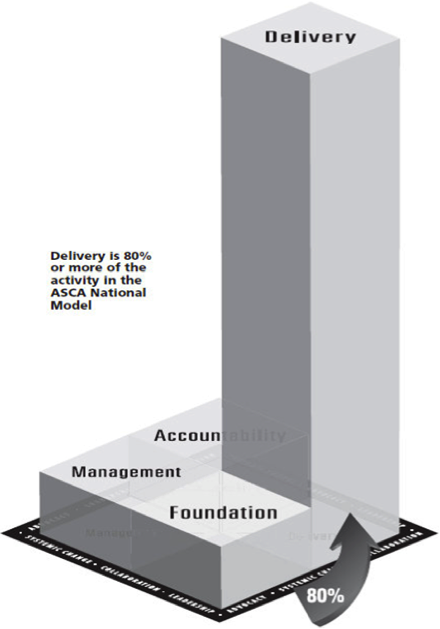School Counselors Transitioning to ASCA Comprehensive School Counseling ModelBy Stacy Eslick, WSCA Executive Director & Gregg Curtis, DPI School Counseling Consultant As part of a study on school administrators’ perceptions of the roles of school counselors in 2008, 124 school administrators were surveyed and 72% of them reported having knowledge of the Wisconsin Comprehensive School Counseling Model (WCSCM) and the accompanying “Model Academic Standards for School Counseling.” These grounded the work done by school counseling programs and counselors around the state. Based on the American School Counselor Association’s (ASCA) National Model (2nd ed.), the WCSCM and its standards provided a framework for counselors’ practice in helping students in their academic, personal/social, and career development. In 2012 ASCA revised and updated their evidence-based practice model in the ASCA National Model (3rd ed), and in 2015 the ASCA “Mindsets and Behaviors: K-12 College and Career-Readiness Standards for Every Student” replaced the previous ASCA standards. This change left Wisconsin school counselors with an antiquated model of practice and out-dated student standards. However, following intentional data collection from the field in 2015/2016 and deliberate, collaborative decision-making by the Wisconsin Department of Public Instruction (DPI) and the Wisconsin School Counselor Association (WSCA), the decision was made to adopt the ASCA National Model (3rd ed.) and the “Mindsets and Behaviors” as the delivery model and student standards for Wisconsin. Linked to the DPI School Counselor Evaluation System (https://dpi.wi.gov/sspw/pupil-services/performance-evaluation-tools/school-counseling-evaluation) the new practice model presents an evidence-based framework for effective school counseling programs. Below are brief overviews of the adopted delivery model and the student standards; with major changes highlighted. The expectation is that school counselors choosing to transition to the ASCA Model will do so over a period of time; not at the flick of a switch. Toward that end, plans for a professional development system for school counselors is in development, with the goal of having an ASCA Model Implementation trainer in every CESA by 2020. As implementation trainings are scheduled, they will be posted on the WSCA website (www.wscaweb.org), pushed out through the DPI school counselors’ list serve, and shared with AWSA for dissemination to their membership. ASCA Model A comprehensive school counseling program is an integral component of the school’s academic mission. Comprehensive school counseling programs, driven by student data and based on standards in academic, career and social/emotional development, promote and enhance the learning process for all students. The ASCA National Model:
4 Themes
Advocacy*Leadership*Collaboration*Systemic Change Foundation: School counselors create comprehensive school counseling programs that focus on student outcomes, teach student competencies and are delivered with identified professional competencies. 1. Program Focus
2. Student Competencies 3. Professional Competencies
Management: School counselors incorporate organizational assessments and tools that are concrete, clearly delineated and reflective of the school’s needs. Assessments and tools include: ● SC Competencies Assessment (NEW) ● SC Program Assessment (REVISED) ● Use of Time Assessment (NEW) ● Annual Agreement (Name change) ● Advisory Council ● Use of Data/School Data Profile (NEW) ● Action Plans ○ Small Group AP (NEW) ○ Curriculum AP ○ Closing-the-Gap AP ● Lesson Plans (NEW) ● Annual & Weekly Calendar Templates Delivery: School counselors provide services to students, parents, school staff and the community in the following areas: Direct Student Services Direct services are in-person interactions between school counselors and students and include the following:
Indirect Student Services Indirect services are provided on behalf of students because of the school counselors’ interactions with others including referrals for additional assistance, consultation and collaboration with parents, teachers, other educators and community organizations.
Accountability: This component is designed to help school counselors analyze data collected from other sections of the ASCA National Model. To demonstrate the effectiveness of the school counseling program in measurable terms, school counselors analyze school and school counseling program data to determine how students are different as a result of the school counseling program. School counselors use data to show the impact of the school counseling program on student achievement, attendance and behavior and analyze school counseling program assessments to guide future action and improve future results for all students. The performance of the school counselor is evaluated on basic standards of practice expected of school counselors implementing a comprehensive school counseling program. 1. Data Analysis – Helps school counselors analyze data that inform decisions about the school counseling program. The data analyzed has been collected over time and informs school counselors about student needs and school and community trends. 2. Program Results – Help school counselors create curriculum, small-group and closing- the-gap results reports. 3. Evaluation and Improvement – Help school counselors analyze self-assessment and program assessment data to identify strengths and areas of improvement. What about standards:
Read more at: Elementary Edition - Secondary Edition - District Level Edition |



